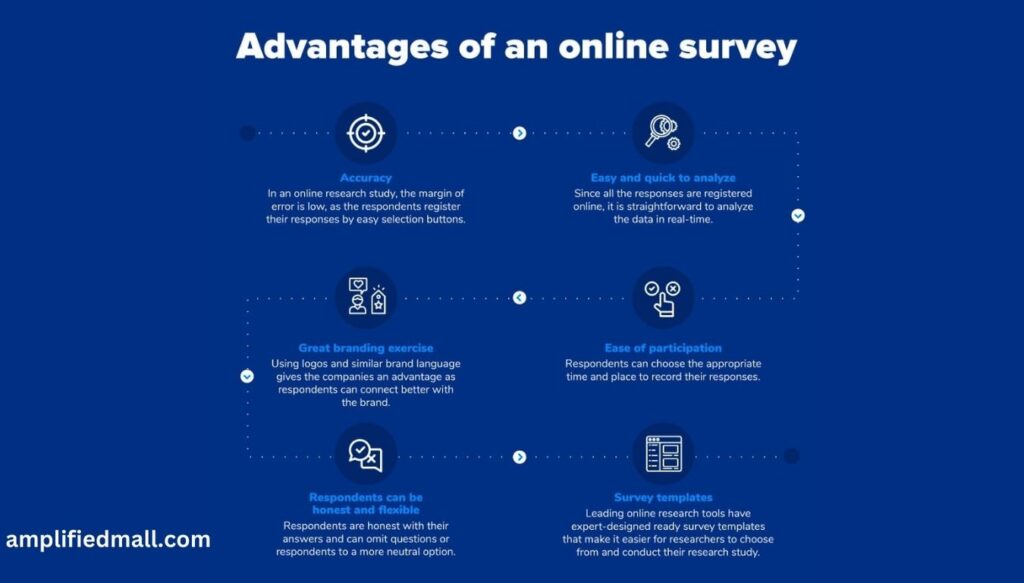Your cart is currently empty!

We now live in an age where everything is ruled by data, so organizations and academia often look for solutions through online surveys to obtain the required information.
However, are online surveys really more effective than traditional methods? When you know the importance and challenges of digital surveys, then decide where to opt them because they have their pros as well cons.
Understanding Online Surveys
Online Surveys: Online surveys are the digital questionnaires created to gather answers from respondents relating to their thoughts, habits and choices.
Three image-based surveys for use with email, social media or survey platforms.
Advantages of Online Surveys

Wider Reach
The biggest advantage of online surveys is your reach. While traditional surveys may be restricted by geography or demographics, online survey can ensure a more diverse population leading to a wider dataset.
Cost-Effectiveness
- Online surveys are commonly more cost-effective than their offline cousins. They also save costs related to printing, postage and data entry.
- That makes them an appealing choice for cash-strapped businesses and researchers.
Speed of Data Collection
- Dynamic Feedback Online surveys give real-time feedback which means data can be generated and analyzed quicker.
- Organizations can collect responses in days rather than weeks and thus come up with decisions faster by relying on current trends and insights.
Convenience for Respondents
Online; participants can do this on their own time which helps in getting higher no of responses.
This flexible process makes it less daunting for respondents to participate and increases their likelihood of engaging, exposing a broader range of perspectives.
Enhanced Data Accuracy
Online surveys also come with the benefit of including validation checks that can help reduce human error in data collection.
Digital options, on the other hand, are likely to improve data quality since people may feel less apprehensive about giving an honest answer.
Comparison of Online Surveys: Advantages vs. Challenges
| Aspect | Advantages | Challenges |
|---|---|---|
| Reach | Access to a large, diverse audience | Potential sample bias if not properly targeted |
| Cost | More affordable than traditional methods | Costs may still arise from incentives or promotions |
| Speed | Real-time data collection | Can still experience delays in responses |
| Convenience | Respondents can participate at their convenience | Low response rates if not effectively promoted |
| Data Accuracy | Built-in validation checks reduce human error | Poorly designed questions can skew results |
| Flexibility | Easy to update or change questions | Technical issues may hinder participation |
| Anonymity | Increased comfort for respondents to provide honest answers | Respondents may not take surveys seriously |
| Analysis | Quick and efficient data analysis | Requires digital literacy from respondents |
Challenges of Online Surveys
Sample Bias
Unfortunately, although online surveys can reach a much wider audience than traditional telephone or face-to-face interviews they can also suffer badly from sample bias if the population of interest is not correctly targeted.
If a survey is mainly distributed on particular platforms, that data may be skewed to reflect the population as a whole.
Low Response Rates
Online surveys can suffer from low participation rates so even though they may seem easy to implement, their use cannot be guaranteed.

Without successful methods of outreach and rewards, it is difficult for businesses to achieve a significant volume in the responses needed using traditional approaches.
Question Design Issues
The stronger the questions are asked through an e-interview, the better would be that online survey.
This is where poorly worded or leading questions can really do damage and things like this take up surprisingly more time than you originally think since it is imperative that there are clear, unbiased question.
Technical Challenges
Respondents can be put off by technical problems, like slow load times or devices that are not supported. The key to get maximum participation lies in a seamless user experience.
In Conclusion: Are Online Surveys Really the Answer?
The effectiveness of web surveys is highly dependent on the goals and methodology used in research. They promise to provide wide reach, cheaper cost and fast speed hence will be a lucrative way of carrying out data collection.
Sample bias and low response rates are challenges that need to be overcome to increase their reliability.
To sum it up, online surveys have the potential to be more potent than traditional methods if we plan and incorporate them strategically.
With a clear goal, solid questions and smart sampling strategies businesses no longer need to worry about the reliability of online surveys.
By understanding the proper way to use online tools, and by learning their benefits as well limitations this will allow an organization to properly analyze whether it is useful for research purposes or not.
FAQs
What are online surveys?
An online survey is a digital questionnaire that allows data about the opinions, preferences and behavior of users to be collected.
These can be distributed through email, social media or specific survey platforms.
How Can I Do Online Surveys?
To begin with, you have to register about poll web-site.
Once you have signed up for an account, You will be able to view available surveys and can choose which ones you want to do in order get paid.
Are online surveys safe?
The very best survey platforms are those that protect the privacy and data security of their users.
But be aware of their privacy policies and hide your confidant stuff from there.
What Do Online Surveys Pay?
Pay differs per platform and survey length; some surveys award points that can be exchanged for gift cards, others give cash. Usually, survey-taking is a side hustle, not career.
What Makes A Good Survey?
A good survey is properly thought out with understandable and impartial questions, on the right audience, marketed effectively to ensure people participate.
But what makes some surveys to have a low response rate?
If your response rate is low, it may be due to factors such as survey length and complexity or not providing incentive of any sort, etc. Better design and outreach can promote participation.
Should I trust polls conducted online?
The reliability of survey results will depend on the quality of answers, how good your targeting is and sample size.
While well-conducted surveys can provide essential feedback for decision making, the question of bias is critical.
 Store Locator
Store Locator Track your Order
Track your Order

